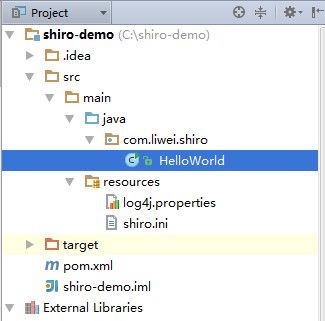- 深入剖析 Java 反序列化:FASTjson 漏洞与 Shiro 漏洞
阿贾克斯的黎明
网络安全phpweb安全开发语言
目录深入剖析Java反序列化:FASTjson漏洞与Shiro漏洞引言Java反序列化原理示例代码FASTjson漏洞分析漏洞成因示例代码防护措施Shiro漏洞分析漏洞成因示例代码(模拟攻击场景)防护措施总结引言在Java应用开发中,反序列化是一项重要的技术,但同时也隐藏着巨大的安全风险。FASTjson和Shiro作为Java开发中常用的工具和框架,其反序列化漏洞曾引发了广泛关注。本文将深入探讨
- MD5解密为什么不能成功(解密算法)
浪九天
算法Javajava算法
MD5解密为什么不能成功(解密算法)首先MD5的密文数量36的32次方;不加盐,不迭代,A-Z,a-z,0-9,8-16位密码,计算量:62的8次方至62的16次方工具类暴力算法结合数据库实现补充说明(原因)生成密文的工具类packagecom.decrypt;importorg.apache.shiro.crypto.hash.SimpleHash;publicclassDecyrpt{priv
- Spring Boot集成Shiro认证
利瑞华
springboot后端java
在现代Web开发中,安全性是至关重要的。Shiro是一个强大的Java安全框架,提供了认证、授权、加密和会话管理等功能。本文将详细介绍如何在SpringBoot项目中集成Shiro进行用户认证。一、项目准备首先,我们需要创建一个SpringBoot项目,并添加必要的依赖。在pom.xml文件中添加Shiro、MyBatis、数据库驱动和Thymeleaf等依赖:org.springframewor
- 使用 Shiro 和 JPA 结合 MySQL 实现一个简易权限管理系统
Java猿_
mysql数据库
1.项目设置首先,确保你的项目已经配置好Maven或Gradle依赖管理工具,并添加以下依赖:Maven依赖org.apache.shiroshiro-core1.9.0org.apache.shiroshiro-web1.9.0org.springframework.bootspring-boot-starter-data-jpamysqlmysql-connector-java8.0.26or
- Shiro 框架详解
大家都说我身材好
Java高级springjavashiro
Shiro是一款轻量级的Java安全框架,提供了身份认证、授权、加密和会话管理等功能。它可以集成到任何JavaWeb应用程序中,并且易于使用和扩展。Shiro的设计理念是简洁而灵活,不仅可以应用于Web应用程序,还可以应用于命令行、移动设备和分布式系统等各种应用场景。1.Shiro的概述Shiro是一个开源的Java安全框架,由Apache开发和维护。Shiro可以帮助开发人员快速实现安全特性,包
- shrio反序列化分析
红队蓝军
java开发语言安全
shiro550环境搭建https://codeload.github.com/apache/shiro/zip/shiro-root-1.2.4配置pom.xmljavax.servletjstlruntimejavax.servletservlet-apiprovidedorg.slf4jslf4j-log4j12runtimelog4jlog4jruntimenet.sourceforge.
- shiro 反序列化漏洞解决方案
小明同学哦
1024程序员节
问题版本shiro1.2.4官方默认key:kPH+bIxk5D2deZiIxcaaaA==获取相关信息解决方案:升级到更新版本:1.3.0兼容jdk1.7检测工具:shiro_attack-4.7.0-SNAPSHOT-all.zip
- go语言获取机器的进程和进程运行参数 获取当前进程的jmx端口 go调用/jstat获取当前Java进程gc情况
march of Time
gojvmgolangjavapython
这里主要分享go中获取机器进程和进程参数的一些代码获取当前机器所有的pid:import"github.com/shirou/gopsutil/process"pids,err:=process.Pids()for_,pid:=rangepids{proc,err:=process.NewProcess(pid)iferr!=nil{log.Errorf("getpid%dinfoerror:%s
- vulhub漏洞复现 Apache Shiro 1.2.4反序列化漏洞 Apache Shiro 认证绕过漏洞
记录笔记
linuxdocker
vulhub漏洞复现ApacheShiro1.2.4反序列化漏洞ApacheShiro认证绕过漏洞
- 深入剖析 Apache Shiro550 反序列化漏洞及复现
垚垚 Securify 前沿站
十大漏洞网络安全apacheweb安全系统安全运维
目录前言一、认识ApacheShiro二、反序列化漏洞:隐藏在数据转换中的风险三、Shiro550漏洞:会话管理中的致命缺陷四、漏洞危害:如多米诺骨牌般的连锁反应五、漏洞复现:揭开攻击的神秘面纱(一)准备工作(二)复现过程六、总结与防范:筑牢安全防线结语前言在网络安全的复杂版图中,漏洞的挖掘与研究始终处于核心位置。今天,我们将聚焦于臭名昭著的ApacheShiro550反序列化漏洞,深入探究其背后
- Gateway网关鉴权
小码农叔叔
springboot相关网关与限流术Gateway网关鉴权
前言说起鉴权,大多数会立马想到各种鉴权的技术,比如过滤器、拦截器、安全治理框架shiro、spring-security等等,它们在不同的业务场景下发挥的作用各不相同,但是总体来说都有一个相似的作用,就是作为后端服务的安全防护层而在微服务架构越加流行的时代,网关作为一个独立的组件从众多的服务中拆分出来作为架构的一部分,承载着重大的作用,比如安全拦截,动态路由,负载均衡等,这一点之前的zuul和ga
- 2020年Java面试题(3年的工作总结)
web18285482512
面试学习路线阿里巴巴java开发语言
花了几天整理的资料,自己凭经验感觉那里重要,就记住那里.今年发生新型冠状病毒感染,在我的印象里已经28天了,加油中国!!!1.mysql面试题(20道题)2.Mysql索引原理以及索引优化面试题(10道题)3.Java基础面试题(10道题)4.详细的说明:List接口,Set接口,Map接口5.HashMap的面试题(10道题)6.springboot+ssm框架面试题(40道题)7.shiro面
- Shiro
羽愿
后端
1.会话管理Shiro提供了完整的企业级会话管理功能,不依赖于底层容器(如Tomcat),不管是J2SE还是J2EE环境都可以使用,提供了会话管理,会话事件监听,会话存储/持久化,容器无关的集群,失效/过期支持,对Web的透明支持,SSO单点登录的支持等特性。1.1会话相关APISubject.getSession():获取当前用户的会话,如果当前没有创建会话对象,则会创建一个新的会话。这等价于S
- Springboot+Vue的前后端分离的相册管理系统
叁拾舞
javaspringbootvue.js
相册名:wuPic注意注意:相册管理系统现已升级2.0版本。加入springshiro控制权限。更新内容如下:普通用户:查看图片(非私密图片)。上传图片。管理自己的图片。管理自己的相册。管理员:查看所有的图片(不包含隐私图片)。管理所有图片。管理所有相册。发布公告。游客:只能查看首页的图片。无法查看相册、管理相册以及上传图片。更新之后的代码我已经上传到资源,大家下载之后遇到任何问题可直接私信我。目
- 基于SSM的大王门店管理系统设计与实现
qq1744828575
javajava
目录摘要IAbstractII引言11相关技术31.1SSM31.1.1Spring31.1.2SpringMVC31.1.3MyBatis41.2Shiro41.3前端技术41.3.1Bootstrap41.3.2jQuery41.3.3Ajax51.3.4Layui51.3.5Thymeleaf51.4本章小结62系统分析72.1功能需求分析72.2非功能需求113系统设计133.1系统总体设
- 基于Maven的Spring/SpringMVC/Mybatis/Mybatis-plus/Apache-Shiro基础环境配置
weixin_30685029
javajson测试
记录一下,以便不时之需。pom.xml122.534.2.5.RELEASE41.8.9563.4.071.3.089101.1.7110.1.4121.7.211314151.0.18165.1.381718191.2.22021224.122324252627javax.servlet28servlet-api29${servlet-api.version}30provided31323334
- Shiro框架源码学习笔记
a88729845
shiro
文章目录介绍认证术语如何使用Shiro的认证1.手机认证主体和凭据2.提交认证主体和凭据到认证系统3.允许访问,重新认证,或阻止访问"RememberMeSupport"RememberedvsAuthenticated登出授权授权三要素权限权限的粒度角色隐式的角色显式的角色(推荐)用户Shiro如何执行授权编程式授权角色检查权限检查实现`Permission`接口的方式使用`String`表示一
- 《Apache Shiro 源码解析》- 11.Shiro 对 Spring 的支持
大漠穷秋9527
《ApacheShiro源码解析》apachespringjavaShiro权限管理后端
11.Shiro对Spring的支持Shiro的第一个版本发布于2004年,Spring项目起源于2002年,在Shiro最初的版本中没有与Spring相关的内容。后来,随着Spring的流行,从2010年开始,Shiro开始提供对Spring的支持,推出了一个独立的jar包,名为shiro-spring。从2018年开始,Shiro在v1.4中开始增强对SpringBoot的支持。在本章中,我们
- spring security解析----架构解读
梦醉天下
编程安全springsecurity
之前写了一个关于session的,看到大家现在用springsecurity还挺多,相比当时我开始用的时候,大家都在shiro。就写几篇关于springsecurity实践以后的总结吧。先从整体的springsecurity架构设计谈谈。(后面很多内容都是借用官网最新文档)springsecurity是spring框架下的安全解决方案,从刚开始到现在,已经经历了很多版本,但是总的架构设计没有变化。
- 企业级应用框架guns架构与开发实践
福建低调
本文还有配套的精品资源,点击获取简介:在IT领域,企业架构是组织信息和技术集成设计的关键。"guns"项目提供了一套高效、灵活且可扩展的企业管理架构设计框架。本文深入探讨guns项目的核心特性、应用场景和开发实践,以及如何使用不同的集成开发环境(IDE)进行项目开发。guns基于SpringBoot框架,集成MyBatis和Shiro,简化了微服务开发和权限控制,确保了数据安全。文章还详细介绍了g
- RuoYi(若依)框架的介绍与基本使用(超详细分析)
涔溪
前端框架ruoyi
**RuoYi(若依)**是一个基于SpringBoot和SpringCloud的企业级快速开发平台。它集成了多种常用的技术栈和中间件,旨在帮助企业快速构建稳定、高效的应用系统。以下是关于RuoYi框架的详细介绍和基本使用教程,涵盖了从环境搭建到核心功能的使用。RuoYi框架简介1.技术栈后端技术:SpringBoot,MyBatis,Druid,Redis,Shiro/SpringSecurit
- 网络安全面试题及经验分享
网安墨雨
web安全经验分享安全
本文内容是i春秋论坛面向专业爱好者征集的关于2023年面试题目和答案解析,题目是真实的面试经历分享,具有很高的参考价值。shiro反序列化漏洞的原理Shiro反序列化漏洞的原理是攻击者通过精心构造恶意序列化数据,使得在反序列化过程中能够执行任意代码。Shiro是一个Java安全框架,提供了身份验证、授权、加密和会话管理等功能。其中,Shiro的序列化功能可以将对象序列化为字节流,以便在不同的系统之
- SpringSecurity初学总结
weixin_66442229
spring
springSecurity安全框架基于Java的安全框架主要有:SpringSecurity和Shiro介绍基础概念安全框架是对用户访问权限的控制,保证应用的安全性。其主要的工作是用户认证和用户授权|鉴权主要应用于Spring的企业应用系统,提供声明式的安全访问控制解决方案。它提供了一组可以在Spring应用上下文中配置的Bean能很好的结合Spring的DI依赖注入和AOP面向切面编程功能应用
- 关于项目中使用shiro进行安全管理的总结
一颗大青柠
JavaShirojavaspring
关于项目中使用shiro进行安全管理的总结关于SpringBoot下使用shiro进行用户认证与权限管理对于安全框架有一定了解的开发者一定对于shiro这款安全框架有一定的了解,这里我们不再对该框架进行其设计与知识的介绍,仅对于我的个人项目中所使用到的进行一个总结,并放上代码。使用该框架的第一步,进行配置:packagecom.libvirtjava.demo.vm.util.config;imp
- Apache Shiro安全框架(2)-用户认证
heyrian
Javashiro
身份认证在shiro中用户需要提供用户的principals(身份)和credentials(证明)来证明该用户属于当前系统用户。常见的认证方式即用户名/密码。在解释身份认证之前,我们先来看看shiro中的Subject和Realm,这是身份认证的两个关键的概念。Subjectsubject代表当前用户,内部主要维护当前用户信息。shiro中所有的subject都交给SecurityManager
- 毕设/私活/bigold必备项目,一个挣钱的免费的全开源标准前后端分离后台管理权限系统【springboot+vue+redis+Spring Security】脚手架搭建:若依Ruo框架具体使用教程
南北极之间
前端开发springbootvuespringboot+vue免费后台管理系统毕业私活后台权限系统
【建议收藏】毕设/私活/大佬必备,一个挣钱的标准开源前后端分离【springboot+vue+redis+SpringSecurity】脚手架一个免费的开源后台管理系统:若依框架(具体使用教程:具体怎样下载?怎样使用?怎样配置后台接口地址?超详细)简介RuoYi是一个JavaEE企业级快速开发平台,基于经典技术组合(SpringBoot、ApacheShiro、MyBatis、Thymeleaf、
- 解锁Apache Shiro:新手友好的安全框架指南(一)——整体架构与身份认证_apache shiro的配置包括安全管理器(2)
2401_84281748
程序员apache安全架构
ApacheShiro是一个功能强大且易于使用的Java安全框架,它执行身份验证、授权、加密和会话管理,可用于保护任何应用程序——从命令行应用程序、移动应用程序到最大的web和企业应用程序。Shiro提供了应用程序安全API来执行以下方面:Authentication(认证):验证用户身份,即用户登录。Authorization(授权):访问控制Cryptography(密码学):保护或隐藏私密数
- springmvc用配置类替换xml配置
码里法
其他javamvcspring
ssm基础项目整合前言xml配置mybatis.xmlspingmvc.xmlweb.xml配置类jdbc配置类mybatis配置SpringConfig配置SpringMvcConfig配置shiro配置WebInit前言其实这中间用配置类,发现问题还挺多的,所以记录一下,尤其是针对shiro的配置。xml配置mybatis.xmlArchetypeCreatedWebApplicationdi
- (shiro加密)2019-03-27
_麻辣香锅不要辣
参考:spring-shiro的密码加密配置凭证匹配器@BeanpublicHashedCredentialsMatcherhashedCredentialsMatcher(){HashedCredentialsMatcherhashedCredentialsMatcher=newHashedCredentialsMatcher();hashedCredentialsMatcher.setHash
- shiro 采用redis共享session,出现反序列化错误的排查过程
nightseventhunit
redisjava数据库
这是一个老系统改造的过程,该老系统采用的框架是#jfinal#shiroredis,采用outh2协议的方式,对多个子系统之间进行单点登录,以实现系统之间的session,由于速度方面的影响,现在要改造成多个系统之间共享session,并采用redis集群的方式。说明一下当前项目的整体运行环境,此项目的多个子系统都在同一个域名下,通过上下文不同来区分子系统。以下将记录整个改造过程,采用jfinal
- 深入浅出Java Annotation(元注解和自定义注解)
Josh_Persistence
Java Annotation元注解自定义注解
一、基本概述
Annontation是Java5开始引入的新特征。中文名称一般叫注解。它提供了一种安全的类似注释的机制,用来将任何的信息或元数据(metadata)与程序元素(类、方法、成员变量等)进行关联。
更通俗的意思是为程序的元素(类、方法、成员变量)加上更直观更明了的说明,这些说明信息是与程序的业务逻辑无关,并且是供指定的工具或
- mysql优化特定类型的查询
annan211
java工作mysql
本节所介绍的查询优化的技巧都是和特定版本相关的,所以对于未来mysql的版本未必适用。
1 优化count查询
对于count这个函数的网上的大部分资料都是错误的或者是理解的都是一知半解的。在做优化之前我们先来看看
真正的count()函数的作用到底是什么。
count()是一个特殊的函数,有两种非常不同的作用,他可以统计某个列值的数量,也可以统计行数。
在统
- MAC下安装多版本JDK和切换几种方式
棋子chessman
jdk
环境:
MAC AIR,OS X 10.10,64位
历史:
过去 Mac 上的 Java 都是由 Apple 自己提供,只支持到 Java 6,并且OS X 10.7 开始系统并不自带(而是可选安装)(原自带的是1.6)。
后来 Apple 加入 OpenJDK 继续支持 Java 6,而 Java 7 将由 Oracle 负责提供。
在终端中输入jav
- javaScript (1)
Array_06
JavaScriptjava浏览器
JavaScript
1、运算符
运算符就是完成操作的一系列符号,它有七类: 赋值运算符(=,+=,-=,*=,/=,%=,<<=,>>=,|=,&=)、算术运算符(+,-,*,/,++,--,%)、比较运算符(>,<,<=,>=,==,===,!=,!==)、逻辑运算符(||,&&,!)、条件运算(?:)、位
- 国内顶级代码分享网站
袁潇含
javajdkoracle.netPHP
现在国内很多开源网站感觉都是为了利益而做的
当然利益是肯定的,否则谁也不会免费的去做网站
&
- Elasticsearch、MongoDB和Hadoop比较
随意而生
mongodbhadoop搜索引擎
IT界在过去几年中出现了一个有趣的现象。很多新的技术出现并立即拥抱了“大数据”。稍微老一点的技术也会将大数据添进自己的特性,避免落大部队太远,我们看到了不同技术之间的边际的模糊化。假如你有诸如Elasticsearch或者Solr这样的搜索引擎,它们存储着JSON文档,MongoDB存着JSON文档,或者一堆JSON文档存放在一个Hadoop集群的HDFS中。你可以使用这三种配
- mac os 系统科研软件总结
张亚雄
mac os
1.1 Microsoft Office for Mac 2011
大客户版,自行搜索。
1.2 Latex (MacTex):
系统环境:https://tug.org/mactex/
&nb
- Maven实战(四)生命周期
AdyZhang
maven
1. 三套生命周期 Maven拥有三套相互独立的生命周期,它们分别为clean,default和site。 每个生命周期包含一些阶段,这些阶段是有顺序的,并且后面的阶段依赖于前面的阶段,用户和Maven最直接的交互方式就是调用这些生命周期阶段。 以clean生命周期为例,它包含的阶段有pre-clean, clean 和 post
- Linux下Jenkins迁移
aijuans
Jenkins
1. 将Jenkins程序目录copy过去 源程序在/export/data/tomcatRoot/ofctest-jenkins.jd.com下面 tar -cvzf jenkins.tar.gz ofctest-jenkins.jd.com &
- request.getInputStream()只能获取一次的问题
ayaoxinchao
requestInputstream
问题:在使用HTTP协议实现应用间接口通信时,服务端读取客户端请求过来的数据,会用到request.getInputStream(),第一次读取的时候可以读取到数据,但是接下来的读取操作都读取不到数据
原因: 1. 一个InputStream对象在被读取完成后,将无法被再次读取,始终返回-1; 2. InputStream并没有实现reset方法(可以重
- 数据库SQL优化大总结之 百万级数据库优化方案
BigBird2012
SQL优化
网上关于SQL优化的教程很多,但是比较杂乱。近日有空整理了一下,写出来跟大家分享一下,其中有错误和不足的地方,还请大家纠正补充。
这篇文章我花费了大量的时间查找资料、修改、排版,希望大家阅读之后,感觉好的话推荐给更多的人,让更多的人看到、纠正以及补充。
1.对查询进行优化,要尽量避免全表扫描,首先应考虑在 where 及 order by 涉及的列上建立索引。
2.应尽量避免在 where
- jsonObject的使用
bijian1013
javajson
在项目中难免会用java处理json格式的数据,因此封装了一个JSONUtil工具类。
JSONUtil.java
package com.bijian.json.study;
import java.util.ArrayList;
import java.util.Date;
import java.util.HashMap;
- [Zookeeper学习笔记之六]Zookeeper源代码分析之Zookeeper.WatchRegistration
bit1129
zookeeper
Zookeeper类是Zookeeper提供给用户访问Zookeeper service的主要API,它包含了如下几个内部类
首先分析它的内部类,从WatchRegistration开始,为指定的znode path注册一个Watcher,
/**
* Register a watcher for a particular p
- 【Scala十三】Scala核心七:部分应用函数
bit1129
scala
何为部分应用函数?
Partially applied function: A function that’s used in an expression and that misses some of its arguments.For instance, if function f has type Int => Int => Int, then f and f(1) are p
- Tomcat Error listenerStart 终极大法
ronin47
tomcat
Tomcat报的错太含糊了,什么错都没报出来,只提示了Error listenerStart。为了调试,我们要获得更详细的日志。可以在WEB-INF/classes目录下新建一个文件叫logging.properties,内容如下
Java代码
handlers = org.apache.juli.FileHandler, java.util.logging.ConsoleHa
- 不用加减符号实现加减法
BrokenDreams
实现
今天有群友发了一个问题,要求不用加减符号(包括负号)来实现加减法。
分析一下,先看最简单的情况,假设1+1,按二进制算的话结果是10,可以看到从右往左的第一位变为0,第二位由于进位变为1。
- 读《研磨设计模式》-代码笔记-状态模式-State
bylijinnan
java设计模式
声明: 本文只为方便我个人查阅和理解,详细的分析以及源代码请移步 原作者的博客http://chjavach.iteye.com/
/*
当一个对象的内在状态改变时允许改变其行为,这个对象看起来像是改变了其类
状态模式主要解决的是当控制一个对象状态的条件表达式过于复杂时的情况
把状态的判断逻辑转移到表示不同状态的一系列类中,可以把复杂的判断逻辑简化
如果在
- CUDA程序block和thread超出硬件允许值时的异常
cherishLC
CUDA
调用CUDA的核函数时指定block 和 thread大小,该大小可以是dim3类型的(三维数组),只用一维时可以是usigned int型的。
以下程序验证了当block或thread大小超出硬件允许值时会产生异常!!!GPU根本不会执行运算!!!
所以验证结果的正确性很重要!!!
在VS中创建CUDA项目会有一个模板,里面有更详细的状态验证。
以下程序在K5000GPU上跑的。
- 诡异的超长时间GC问题定位
chenchao051
jvmcmsGChbaseswap
HBase的GC策略采用PawNew+CMS, 这是大众化的配置,ParNew经常会出现停顿时间特别长的情况,有时候甚至长到令人发指的地步,例如请看如下日志:
2012-10-17T05:54:54.293+0800: 739594.224: [GC 739606.508: [ParNew: 996800K->110720K(996800K), 178.8826900 secs] 3700
- maven环境快速搭建
daizj
安装mavne环境配置
一 下载maven
安装maven之前,要先安装jdk及配置JAVA_HOME环境变量。这个安装和配置java环境不用多说。
maven下载地址:http://maven.apache.org/download.html,目前最新的是这个apache-maven-3.2.5-bin.zip,然后解压在任意位置,最好地址中不要带中文字符,这个做java 的都知道,地址中出现中文会出现很多
- PHP网站安全,避免PHP网站受到攻击的方法
dcj3sjt126com
PHP
对于PHP网站安全主要存在这样几种攻击方式:1、命令注入(Command Injection)2、eval注入(Eval Injection)3、客户端脚本攻击(Script Insertion)4、跨网站脚本攻击(Cross Site Scripting, XSS)5、SQL注入攻击(SQL injection)6、跨网站请求伪造攻击(Cross Site Request Forgerie
- yii中给CGridView设置默认的排序根据时间倒序的方法
dcj3sjt126com
GridView
public function searchWithRelated() {
$criteria = new CDbCriteria;
$criteria->together = true; //without th
- Java集合对象和数组对象的转换
dyy_gusi
java集合
在开发中,我们经常需要将集合对象(List,Set)转换为数组对象,或者将数组对象转换为集合对象。Java提供了相互转换的工具,但是我们使用的时候需要注意,不能乱用滥用。
1、数组对象转换为集合对象
最暴力的方式是new一个集合对象,然后遍历数组,依次将数组中的元素放入到新的集合中,但是这样做显然过
- nginx同一主机部署多个应用
geeksun
nginx
近日有一需求,需要在一台主机上用nginx部署2个php应用,分别是wordpress和wiki,探索了半天,终于部署好了,下面把过程记录下来。
1. 在nginx下创建vhosts目录,用以放置vhost文件。
mkdir vhosts
2. 修改nginx.conf的配置, 在http节点增加下面内容设置,用来包含vhosts里的配置文件
#
- ubuntu添加admin权限的用户账号
hongtoushizi
ubuntuuseradd
ubuntu创建账号的方式通常用到两种:useradd 和adduser . 本人尝试了useradd方法,步骤如下:
1:useradd
使用useradd时,如果后面不加任何参数的话,如:sudo useradd sysadm 创建出来的用户将是默认的三无用户:无home directory ,无密码,无系统shell。
顾应该如下操作:
- 第五章 常用Lua开发库2-JSON库、编码转换、字符串处理
jinnianshilongnian
nginxlua
JSON库
在进行数据传输时JSON格式目前应用广泛,因此从Lua对象与JSON字符串之间相互转换是一个非常常见的功能;目前Lua也有几个JSON库,本人用过cjson、dkjson。其中cjson的语法严格(比如unicode \u0020\u7eaf),要求符合规范否则会解析失败(如\u002),而dkjson相对宽松,当然也可以通过修改cjson的源码来完成
- Spring定时器配置的两种实现方式OpenSymphony Quartz和java Timer详解
yaerfeng1989
timerquartz定时器
原创整理不易,转载请注明出处:Spring定时器配置的两种实现方式OpenSymphony Quartz和java Timer详解
代码下载地址:http://www.zuidaima.com/share/1772648445103104.htm
有两种流行Spring定时器配置:Java的Timer类和OpenSymphony的Quartz。
1.Java Timer定时
首先继承jav
- Linux下df与du两个命令的差别?
pda158
linux
一、df显示文件系统的使用情况,与du比較,就是更全盘化。 最经常使用的就是 df -T,显示文件系统的使用情况并显示文件系统的类型。 举比例如以下: [root@localhost ~]# df -T Filesystem Type &n
- [转]SQLite的工具类 ---- 通过反射把Cursor封装到VO对象
ctfzh
VOandroidsqlite反射Cursor
在写DAO层时,觉得从Cursor里一个一个的取出字段值再装到VO(值对象)里太麻烦了,就写了一个工具类,用到了反射,可以把查询记录的值装到对应的VO里,也可以生成该VO的List。
使用时需要注意:
考虑到Android的性能问题,VO没有使用Setter和Getter,而是直接用public的属性。
表中的字段名需要和VO的属性名一样,要是不一样就得在查询的SQL中
- 该学习笔记用到的Employee表
vipbooks
oraclesql工作
这是我在学习Oracle是用到的Employee表,在该笔记中用到的就是这张表,大家可以用它来学习和练习。
drop table Employee;
-- 员工信息表
create table Employee(
-- 员工编号
EmpNo number(3) primary key,
-- 姓

